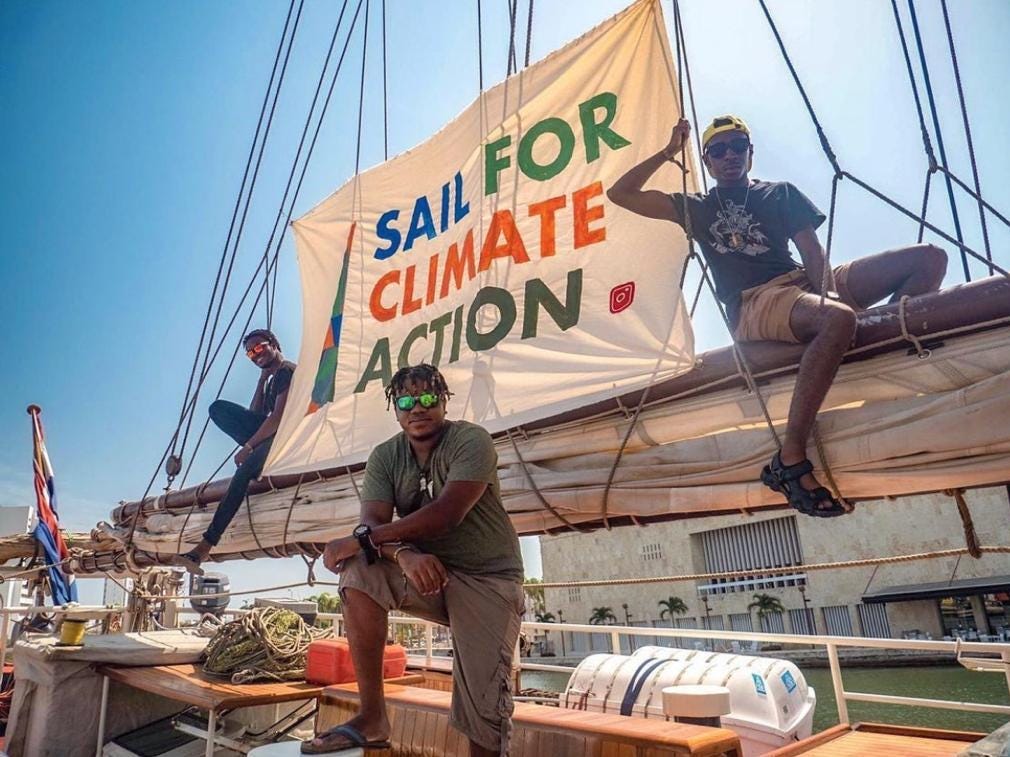
Parisa Hashempour
- At COP26, young activists with Unite For Climate Action shared their stories on the front lines of the climate crisis.
- With climate issues greatly affecting their homelands, they're determined to make their voices heard.
- Despite being unable to access the same spaces as country representatives, they've come with solutions and are looking for investors.
Activists and delegates from developing countries are underrepresented at COP26. Due to vaccine and visa issues, as well as difficulties financing trips to the summit – or affording accommodation when they arrive – those living on the front lines of the climate crisis are also those who may feel least heard.
"When we say we are on the front lines of this crisis," said 29-year-old O'Neil Leadon, a project coordinator and activist from Barbados, "we are saying that we are seeing the effects of climate change in real-time." His activist network, Unite For Climate Action, has come to COP26 from around the world to tell their stories.
"We aren't thinking about the projected warming of 2 degrees Celsius," Leadon said. "We are at 1.3 degrees now, and the beaches I went to as a kid are no longer there. We are 1.3 degrees, and our hurricane season is creeping further into winter and starting earlier in spring."
Hurricanes in the region are becoming more frequent, sustained, and intense due to anthropogenic climate change. In the aftermath of 2019's Hurricane Dorian, which left 70,000 people in need of humanitarian assistance, he added: "Two years on, we are still recovering. There are people who still don't have homes, who still haven't buried loved ones."
This concern is echoed by members across their network. Daniela Larios, a 27-year-old climate change and marine conservation consultant from Honduras, shares how thousands of migrants leave her homeland every month to escape the ravages of climate-related disasters. Unite For Climate Action member, Devon Carter, a 28-year-old research assistant, and activist from Anguilla, added: "Our school systems still haven't recovered from Hurricane Irma. My front yard went from being trees and rocks to a beach. Some people didn't have electricity for four months."
But it is not just natural disasters that activists from the global south are bearing witness to. Daniela Balaguera Villafaña, a 27-year-old indigenous activist from the Arhuaco people of the Sierra Nevada de Santa Marta in Columbia, has come to COP26 to explain how drug and plant trafficking and a lack of food sovereignty, are all tied up in issues of climate change.
"Our culture is under threat," she said. "Indigenous people are connected to mother nature. Our rituals and traditional medicines are practiced using natural resources like shells, seeds, and plants." With industries polluting her people's territories, she said: "We cannot access these things anymore. And if we cannot sustain our culture, we cannot sustain our identity."
Some young activists, who are also protectors of indigenous lands, have left their crucial posts at home to visit the summit in Scotland. They are frustrated by a lack of access to the spaces in which world leaders are making decisions on their behalf, but they are nonetheless organizing, finding solutions, and looking for crucial investments.
"If we don't make solutions profitable, change will be hard," said 23-year-old entrepreneur and Unite For Climate Action member, Ashneil Jeffers, from Montserrat. "If we want developed countries to give us $100 billion a year for loss and damages, where is that money coming from if we also tell them to cut the emissions their production is based on?" With plans to draw geothermal investors to his home island, Jeffers laughed that: "I have a few ideas that could give Elon Musk a run for his money, I just need the opportunities he had!"
Their priorities, they press, are different from those living in developed countries. As such, the way they approach the fight against climate change is different too. "You want everyone to be vegan?" Leadon said. "That's not going to help us; you want everyone to throw away straws? I don't have any straws, and I also may not have a place to live tomorrow if the wrong storm comes by."
These priorities are also different from their country representatives. "Delegates from our countries, with their own interests, have come here to paint the picture that everything is fine," Larios said. "But everything is not fine - we are here to tell the truth, to make our stories heard."
